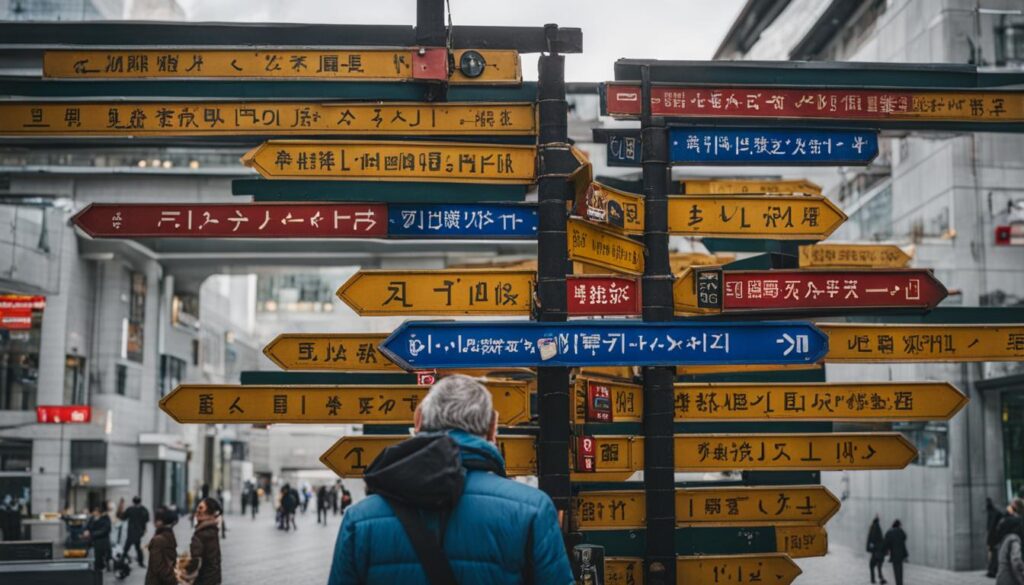As a traveler, the language barrier can hinder your experience in a foreign country. Whether you’re looking to establish a connection with the locals or simply order food in a restaurant, language learning challenges can be overwhelming. The good news is that there are effective language learning solutions that can assist in overcoming these hurdles.
In this article, we will explore common language learning challenges that travelers face and provide practical techniques, tips, and resources to enhance your language learning journey. By implementing these strategies, you can communicate more confidently with locals and gain a deeper understanding of the culture around you.
Ready to take the first step in your language learning journey? Let’s dive into the specific challenges that travelers may encounter when learning a foreign language, so you can learn how to best address these obstacles.
Understanding Language Learning Challenges
Learning a new language can be an exciting adventure, but it comes with its own set of challenges. Understanding and overcoming these hurdles is essential to achieving fluency.
| Challenge | Tips |
|---|---|
| Lack of Confidence | Tip: Start with basic phrases and build your way up. Don’t be afraid to make mistakes – they are an essential part of the learning process. |
| Difficulty with Memorization | Tip: Use visual aids such as flashcards or diagrams to help remember vocabulary. Repeat phrases aloud to improve retention. |
| Cultural Barriers | Tip: Immerse yourself in the culture and seek out opportunities to engage with native speakers. Learn about customs and traditions to gain a deeper understanding of the language. |
| Time Constraints | Tip: Incorporate language learning into your daily routine, even in small increments. Use downtime during travel to practice and learn new words. |
By recognizing and addressing these challenges, you can make significant progress in your language learning journey. Remember to stay motivated and committed to your goal.
Immersion for Efficient Language Learning
Learning a new language can be a challenging process. However, immersion is an effective technique to accelerate your language learning journey. Immersion involves surrounding yourself with the language, providing a rich experience that allows you to absorb the language more naturally and efficiently. Below are various immersion techniques and strategies that you can use:
1. Language Exchange Programs
A language exchange program is an opportunity to practice your target language with a native speaker who wants to learn your language. You can find language exchange programs online or through local community groups. Having regular conversations with native speakers can rapidly improve your speaking and listening skills.
2. Watching Movies and TV Shows
Watching movies and TV shows in your target language can provide an immersive experience that helps you learn new words, phrases, and accents in context. Consider using subtitles in the target language to assist your comprehension.
3. Reading in Your Target Language
Reading in your target language exposes you to grammar and sentence structures, helping you to develop your language skills. You can start with simple materials like children’s books and gradually work your way up to more complex literature.
| Immersion Techniques | Immersion Strategies |
|---|---|
| Speaking with native speakers | Participating in cultural events and activities |
| Traveling to a country where the language is spoken | Surrounding yourself with the language through music, news, and podcasts |
Utilizing immersion techniques and strategies gives you a practical experience that supplements traditional language learning methods and can jumpstart your language learning process.
Utilizing Language Learning Resources
There is no shortage of language learning resources available to you, and incorporating these tools and apps into your daily routine can greatly enhance your language acquisition. Depending on your learning style and preferences, you can choose from a plethora of online courses, language learning apps, podcasts, and textbooks. To narrow down your options, consider factors such as cost, user-friendliness, and content quality.
One of the most widely used language learning apps is Duolingo, which offers free language courses in dozens of languages. The app uses game-like features to enhance engagement and assist with grammar, vocabulary, and pronunciation skills. Another popular app is Babbel, which provides more in-depth language courses in 14 languages, and includes real-life dialogues to improve conversational skills.
When it comes to language learning resources, it’s important to keep in mind that no one-size-fits-all solution exists. What works for one person may not work for another. Experiment with various resources and find the ones that work best for you. A combination of tools and resources may also be effective. For example, you may use language learning apps for vocabulary building and grammar practice, while also taking online courses or hiring a language tutor for more personalized instruction.
Finally, don’t forget to take advantage of quality online forums, discussion boards, and language exchange groups to enhance your learning experience. These resources enable you to connect with language learners and native speakers alike, practice your language skills, and receive support and encouragement along the way.
Overcoming Pronunciation Challenges
Pronunciation is a crucial part of effective communication in a new language. However, it can also be one of the most difficult skills to master. Here are some language learning techniques to help you overcome pronunciation challenges:
- Listen and repeat: Practice imitating native speakers by listening and repeating phrases out loud. This will help you develop your ear for the language and improve your overall pronunciation.
- Break it down: Break down words into smaller parts and practice each individual sound. This will help you identify which sounds you need to focus on and help you master them.
- Utilize language learning resources: Take advantage of language learning apps and websites that focus on pronunciation practice. Choose resources that offer feedback on your pronunciation to ensure you are making progress.
Keep in mind that perfect pronunciation takes time and practice. Don’t get discouraged if it takes a while to notice improvement. Consistent practice is key!
Developing Conversational Skills
One of the main reasons to learn a new language is to be able to communicate with locals during your travels. Developing conversational skills is crucial to be able to interact with them. The following are effective language learning methods and strategies that can aid in developing conversational skills:
- Practice speaking aloud: One of the key ways to develop conversational skills is by speaking aloud. You can practice speaking by yourself or with a language exchange partner.
- Learn common phrases: Learning common phrases in the target language can be very helpful in initiating and maintaining conversations.
- Listen and mimic: Listening to native speakers and mimicking their pronunciation and intonation can be a great way to improve your conversational skills and sound more fluent.
- Join language groups: Joining language groups can provide invaluable opportunities to practice conversational skills. Many language groups now meet online, making it easy and accessible to anyone.
Remember, developing conversational skills requires practice, patience, and perseverance. With these language learning methods and strategies, you can improve your ability to communicate in the target language, making your travels more enjoyable and rewarding.
Navigating Language Barriers in Travel Situations
Travelling to foreign countries can be an exciting adventure, but the language barrier can be a daunting challenge to overcome. Whether you are ordering food or asking for directions, understanding the local language is crucial for successful communication. Here are some practical language learning techniques and strategies to navigate language barriers during travel situations:
1. Learn Basic Phrases
Before traveling to a new country, take the time to learn basic phrases such as “hello,” “thank you,” and “excuse me”. Understanding these phrases will allow for clear communication with the locals and demonstrate effort on your part to bridge the language barrier.
2. Utilize Translation Apps
Translation apps, such as Google Translate or iTranslate, can be extremely helpful in overcoming language barriers. These apps can translate entire sentences or even have a conversation with locals. Take advantage of these apps to ensure successful communication in foreign countries.
3. Use Body Language and Gestures
When communication fails due to language barriers, body language and gestures can be used to convey your message. Try pointing, nodding, or even drawing pictures to get your point across. These nonverbal cues can be effective for basic communication and bridging the language gap.
4. Attend Language Classes
If you are planning an extended stay in a foreign country, attending language classes can be an effective way to learn the local language. Language classes can provide a more in-depth understanding of the language and help build confidence in communication with locals.
5. Immersion in Local Culture
One of the most effective methods of language learning is complete immersion in the local culture. This can be achieved by staying with a local family or living in the area for an extended period of time. By immersing yourself in the local culture, you will have an opportunity to practice the language naturally and improve your communication skills.
By utilizing these language learning techniques and strategies, navigating language barriers in travel situations can become less daunting and more manageable. With effort and perseverance, you can overcome language barriers and communicate successfully with locals, truly experiencing the beauty of foreign cultures.
Building Vocabulary and Retention Techniques
Expanding your vocabulary is crucial when learning a new language. By increasing the number of words you know, you’ll be able to communicate more effectively and understand the nuances of the language. But memorizing new words and retaining them long-term is easier said than done.
Fortunately, there are proven language learning methods that can help you build vocabulary and increase retention. One effective strategy is to use flashcards with pictures or context clues to aid learning. Another is to engage in meaningful conversation and actively use new words in context.
But what about retaining these new words long-term? One technique is to practice spaced repetition, reviewing the words at various intervals to reinforce memory. Additionally, regularly immersing yourself in the language by reading, watching TV shows or movies, and practicing with native speakers can help solidify your knowledge and improve retention.
“Learning a language takes time and effort, but with consistent practice and effective strategies, you can expand your vocabulary and increase retention, leading to more successful communication in your global adventures.”
Conclusion
Traveling abroad can be an exciting adventure, but language barriers can present challenges for communication. Learning a new language can seem overwhelming, but by taking practical steps and utilizing the right resources, you can overcome these challenges and enhance your global experience.
In this article, we have explored the common language learning challenges that travelers face, and provided effective solutions to overcome them. By understanding these challenges and implementing the techniques and strategies provided, you can overcome obstacles and confidently communicate with locals.
Remember, language learning is a journey and requires patience and persistence. With dedication and practice, you can build strong language skills that will last beyond your travels.
Utilize the tips, techniques, and resources shared in this article to enhance your language learning journey and ensure success in overcoming language barriers as a traveler. Don’t let language learning challenges hold you back, embrace the journey and enjoy your global adventures.
Happy travels!

















































